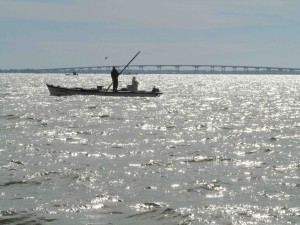By BRUCE RITCHIE
FLORIDAPOLITICS.COM
An official appointed by the U.S. Supreme Court to oversee a lawsuit filed by Florida against Georgia over water use on Monday issued an order providing for confidential talks among the states.

Ralph I. Lancaster, a Maine attorney who’s special master in the case, in a conference call also called the media “relentless and ruthless” and said, “They will do everything they can to publish everything that they can find out.”
Contending that Georgia’s unchecked growth and water use was harming Apalachicola Bay oysters and the seafood industry, Florida Gov. Rick Scott in 2013 asked the Supreme Court to allocate water between the two states. The Supreme Court in November appointed Lancaster to oversee the case.
In March, Scott asked Georgia Gov. Nathan Deal to forward a proposal for resolving differences between the states. Scott’s letter was in response to Deal’s request in February to meet on the issue.
On April 2, Florida and Georgia together asked Lancaster to order that meetings, other communications and documents involving negotiations be kept confidential. In a telephone transcript filed Friday, Lancaster told attorneys from the states that he would issue such an order.
“You can be sure that I will enter a confidentiality order shortly,” Lancaster said in the transcript of an April 7 conference call. “I have not taken a look at the — the points that you made; but if you’re confident that it would act as a shield from the freedom of access laws, that’s fine.”

Soon after he was appointed in November, Lancaster encouraged Florida and Georgia to work on settling the case while also urging them against talking to news reporters.
Lancaster told the states on a Dec. 1 conference call to “use restraint in correspondence with or discussions with the media.”
“My long-term experience with them is that they will take things out of context,” Lancaster said, “and you’ll be trying to explain them for the rest of your lives.”
Scott and Deal used a federal court order in 2010 to shield records involving water talks that led to Florida filing the 2013 lawsuit with the Supreme Court.
When Scott announced his lawsuit, he said Georgia had not negotiated in good faith over water. But Deal said his state had offered a “comprehensive framework” for a water agreement and Florida had never responded.
Both states refused to release records involving the talks because of the confidentiality order issued in 2010 by U.S. District Judge Paul A Magnuson. There have been no filings in that district court case since April 2013.
Alabama, Florida and Georgia have been fighting in federal court since 1990 over water from the Apalachicola, Chattahoochee and Flint rivers. Florida now says Alabama doesn’t need to be involved in the Supreme Court case because the dispute focuses on Georgia’s water use.
(Bruce Ritchie (@bruceritchie) covers environment, energy and growth management in Tallahassee. Story and photos copyrighted by Bruce Ritchie and Floridaenvironments.com. Do not copy, republish or forward without permission, which can be obtained from bruceBritchie@gmail.com.)
